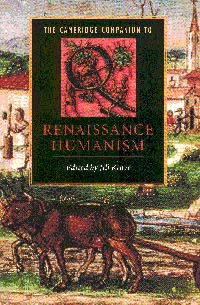Book contents
- Frontmatter
- 1 The origins of humanism
- 2 Classical scholarship
- 3 Humanism in script and print in the fifteenth century
- 4 The humanist reform of Latin and Latin teaching
- 5 Humanist rhetoric and dialectic
- 6 Humanists and the Bible
- 7 Humanism and the origins of modern political thought
- 8 Philologists and philosophers
- 9 Artists and humanists
- 10 Vernacular humanism in the sixteenth century
- 11 The new science and the traditions of humanism
- 12 Humanism and Italian literature
- 13 Humanism and English literature in the fifteenth and sixteenth centuries
- 14 Humanism and seventeenth-century English literature
- A guide to further reading in English
- Biographical index
1 - The origins of humanism
Published online by Cambridge University Press: 28 May 2006
- Frontmatter
- 1 The origins of humanism
- 2 Classical scholarship
- 3 Humanism in script and print in the fifteenth century
- 4 The humanist reform of Latin and Latin teaching
- 5 Humanist rhetoric and dialectic
- 6 Humanists and the Bible
- 7 Humanism and the origins of modern political thought
- 8 Philologists and philosophers
- 9 Artists and humanists
- 10 Vernacular humanism in the sixteenth century
- 11 The new science and the traditions of humanism
- 12 Humanism and Italian literature
- 13 Humanism and English literature in the fifteenth and sixteenth centuries
- 14 Humanism and seventeenth-century English literature
- A guide to further reading in English
- Biographical index
Summary
Any account of the past is necessarily coloured by the preconceptions, the aspirations and, above all, the knowledge or ignorance of the scholar who produces it. The terms and concepts that historians use to order and explain the objects of their inquiry are neither fixed nor value-free, but are evolving and often highly subjective elements in that process of revealing the past that gradually leads us to a better understanding of it. Labels such as Dark Ages or Renaissance, which are affixed to whole periods of European history, while they are convenient for the purposes of historiographical exposition, may tell only part of the truth about those segments of the past that they purport to characterize. The more we learn about the period following the decline of Rome, the less dark and uncultured it appears; the more we inquire into what was reborn in the fourteenth and fifteenth centuries, the more we become aware of vital continuities with the past.
The history of humanism exemplifies both those continuities and a sense of renewal. The term itself owes its origin to the Latin humanitas, used by Cicero and others in classical times to betoken the kind of cultural values that one would derive from what used to be called a liberal education: the studia humanitatis constituted the study of what we might now think of as 'arts' subjects - language, literature, history and moral philosophy in particular. Even if Cicero was not widely read in the Middle Ages, he and his terminology were well known to certain fourteenth-century scholars (notably Petrarch, who regarded him as his favourite author); by the following century, the studia humanitatis were firmly enshrined in the university curriculum.
- Type
- Chapter
- Information
- The Cambridge Companion to Renaissance Humanism , pp. 1 - 19Publisher: Cambridge University PressPrint publication year: 1996
- 18
- Cited by

